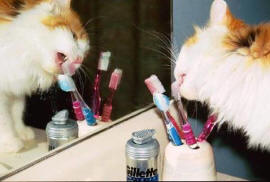|
 An
ounce of prevention… An
ounce of prevention…
A
common mistake people make with new kittens is
allowing bad habits to form by not paying any attention to what
the kitten is doing and learning from day one at home.
Supervise your kitten's activities so you can instruct your kitten by praising what's right and interrupting
what's wrong. Provide constant supervision indoors until ALL house rules
are learned. Keep your kitten in a small kitten-proof room when you
can't supervise.
 Provide for your kitten's basic feline needs
for scratching and
stretching by providing tall scratching posts. Buy toys that
mimic prey to provide mental stimulation, physical exercise and
companionship. Provide for your kitten's basic feline needs
for scratching and
stretching by providing tall scratching posts. Buy toys that
mimic prey to provide mental stimulation, physical exercise and
companionship.
Supervise exploration and you can help your kitten learn your
house rules. Shape your ideal kitten personality by encouraging confident, relaxed,
loving, friendly behaviors.
Teach your kitten using praise, treats and extra loving attention
for behaviors you want.
Ping,
pong kitty
Call your kitten any time you have food.
When your kitten has learned to come when you call, then try
this game. Start with a hungry kitten and human partner. Sit on
either end of a hallway with the hallway doors closed and the
kitten with
you. Take turns calling
the kitten from one end of a hallway to the other.
Give the first treat for free to get the game going.
If your kitten
knows how to sit, give one treat for coming and a second treat for a sit.
Reinforce learning:
Call your kitten
before every meal and before anything wonderful happens. Praise and
give treats each time the kitten comes to you.
Late Socialization: 9 to 16 weeks old
AAFP.
(2004). Feline Behavior Guidelines.
|